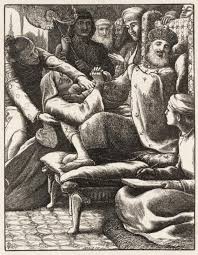The unjust judge and the persistent widow
Mount Calvary
A Roman Catholic Parish
The Personal Ordinariate of S. Peter
Eutaw Street and Madison Avenue
Baltimore, Maryland
Rev. Albert Scharbach, Pastor
Andrew Johnson, Organist and Music Director
Trinity XXIII
November 15, 2020
8:00 A.M. Said Mass
10:00 A.M. Sung Mass
This mass will be livestreamed
_________________
Organ Prelude
“Children of the Heavenly Father,” arr. Andrew Johnson
Both the text and tune of this hymn embrace the childlike faith to which God calls us. After three verses of this Swedish folk hymn, listen for a second well-known hymn tune which complements the first in perfect harmony.
Organ Postlude
“Voluntary in D minor” William Boyce
William Boyce (1711-1779) was an English organist and composer who once served as Master of the King’s Musick. This voluntary begins with a grave introduction before a lively fugue.
________________
Offertory Anthem
“Hear the voice and prayer,” Thomas Tallis
Hear the voice and prayer of thy servants,
that they make before thee this day:
That thine eyes may be open
toward this house night and day,
ever toward this place
of which thou hast said,
“My name shall be there.”
And when thou hear’st
have mercy on them.
Thomas Tallis (1505-1585) composed for the Church of England in the 16th century. This earnest prayer is an early anthem by this composer and uses both imitation and homophony to clearly articulate the text.
_________
Communion Anthem
“If we believe that Jesus died,” John Goss
If we believe that Jesus died and rose again,
Ev’n so them also which sleep in Jesus,
Will God bring with Him.
Wherefore comfort one another with these words.
John Goss (1800-1880) was an organist and music professor in 19th-century England. Goss sets the first line of text describing the death of Jesus in the minor mode using imitation. He then shifts to the major mode to paint the comforting text, “ev’n so them also which sleep in Jesus will God bring with Him.”
_______________
Hymns
When morning gilds the skies is a translation by Poet Laureate Robert Bridges (1844—1930) of a German hymn, Beim frühen Morgenlicht (‘At early morning light’) from Sebastian Pörtner’s Katholisches Gesangbuch (Würzburg, 1828). The tune LAUDES DOMINI is by Joseph Barnby (1838—1896). An accomplished and popular choral director in England, Barnby showed his musical genius early: he was an organist and choirmaster at the age of twelve.
Nearer my God to Thee (BETHANY) is by the Unitarian Sarah Flower Adams (1805-1848). It is based on the story of Jacob’s dream (Genesis 28:10-22), and presents a potent combination of two themes: human suffering (the cross in stanza 1 is not the Cross of Jesus, but a cross that has to be borne) and the merciful presence of God. The stone of Jacob’s pillow becomes the stony griefs out of which the commemorative stone of Bethel will be raised, marking the place where he had his vision of the angels passing up and down between earth and heaven. The hymn rejoices in God, either through sorrow or joy. The legend is it was played by the band of the Titanic as the ship sank. BETHANY was composed by Lowell Mason (1792-1872), the father of American church music.
Hark! A Herald Voice Is Calling (MERTON) is a translation by Edward Caswell (1814-1878) of a Latin hymn, Vox clara ecce intonat. William H. Monk (Brompton, 1823-1889) composed MERTON . The tune’s title is thought to refer to Walter de Merton, founder of Merton College, Oxford.
